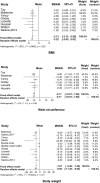Effect of the ketogenic diet on glycemic control, insulin resistance, and lipid metabolism in patients with T2DM: a systematic review and meta-analysis
- PMID: 33257645
- PMCID: PMC7705738
- DOI: 10.1038/s41387-020-00142-z
Effect of the ketogenic diet on glycemic control, insulin resistance, and lipid metabolism in patients with T2DM: a systematic review and meta-analysis
Abstract
Background: At present, the beneficial effect of the ketogenic diet (KD) on weight loss in obese patients is generally recognized. However, a systematic research on the role of KD in the improvement of glycemic and lipid metabolism of patients with diabetes is still found scarce.
Methods: This meta-study employed the meta-analysis model of random effects or of fixed effects to analyze the average difference before and after KD and the corresponding 95% CI, thereby evaluating the effect of KD on T2DM.
Results: After KD intervention, in terms of glycemic control, the level of fasting blood glucose decreased by 1.29 mmol/L (95% CI: -1.78 to -0.79) on average, and glycated hemoglobin A1c by 1.07 (95% CI: -1.37 to -0.78). As for lipid metabolism, triglyceride was decreased by 0.72 (95% CI: -1.01 to -0.43) on average, total cholesterol by 0.33 (95% CI: -0.66 to -0.01), and low-density lipoprotein by 0.05 (95% CI: -0.25 to -0.15); yet, high-density lipoprotein increased by 0.14 (95% CI: 0.03-0.25). In addition, patients' weight decreased by 8.66 (95% CI: -11.40 to -5.92), waist circumference by 9.17 (95% CI: -10.67 to -7.66), and BMI by 3.13 (95% CI: -3.31 to -2.95).
Conclusion: KD not only has a therapeutic effect on glycemic and lipid control among patients with T2DM but also significantly contributes to their weight loss.
Conflict of interest statement
The authors declare that they have no conflict of interest.
Figures




Similar articles
-
Ketogenic Diet Benefits to Weight Loss, Glycemic Control, and Lipid Profiles in Overweight Patients with Type 2 Diabetes Mellitus: A Meta-Analysis of Randomized Controlled Trails.Int J Environ Res Public Health. 2022 Aug 22;19(16):10429. doi: 10.3390/ijerph191610429. Int J Environ Res Public Health. 2022. PMID: 36012064 Free PMC article. Review.
-
Effects of high-protein diet on glycemic control, insulin resistance and blood pressure in type 2 diabetes: A systematic review and meta-analysis of randomized controlled trials.Clin Nutr. 2020 Jun;39(6):1724-1734. doi: 10.1016/j.clnu.2019.08.008. Epub 2019 Aug 15. Clin Nutr. 2020. PMID: 31466731
-
Effect of low-calorie versus low-carbohydrate ketogenic diet in type 2 diabetes.Nutrition. 2012 Oct;28(10):1016-21. doi: 10.1016/j.nut.2012.01.016. Epub 2012 Jun 5. Nutrition. 2012. PMID: 22673594 Clinical Trial.
-
Effects of Mediterranean-style diet on glycemic control, weight loss and cardiovascular risk factors among type 2 diabetes individuals: a meta-analysis.Eur J Clin Nutr. 2015 Nov;69(11):1200-8. doi: 10.1038/ejcn.2014.243. Epub 2014 Nov 5. Eur J Clin Nutr. 2015. PMID: 25369829
-
Effects of tea or tea extract on metabolic profiles in patients with type 2 diabetes mellitus: a meta-analysis of ten randomized controlled trials.Diabetes Metab Res Rev. 2016 Jan;32(1):2-10. doi: 10.1002/dmrr.2641. Epub 2015 Apr 21. Diabetes Metab Res Rev. 2016. PMID: 25689396 Review.
Cited by
-
Impact of low-carbohydrate diet on health status: an umbrella review.Front Nutr. 2024 Sep 25;11:1321198. doi: 10.3389/fnut.2024.1321198. eCollection 2024. Front Nutr. 2024. PMID: 39385794 Free PMC article.
-
Effects of ketogenic diet on health outcomes: an umbrella review of meta-analyses of randomized clinical trials.BMC Med. 2023 May 25;21(1):196. doi: 10.1186/s12916-023-02874-y. BMC Med. 2023. PMID: 37231411 Free PMC article.
-
Maternal Dietary Strategies for Improving Offspring Cardiovascular-Kidney-Metabolic Health: A Scoping Review.Int J Mol Sci. 2024 Sep 10;25(18):9788. doi: 10.3390/ijms25189788. Int J Mol Sci. 2024. PMID: 39337276 Free PMC article. Review.
-
Effect of weight-maintaining ketogenic diet on glycemic control and insulin sensitivity in obese T2D subjects.BMJ Open Diabetes Res Care. 2024 Oct 18;12(5):e004199. doi: 10.1136/bmjdrc-2024-004199. BMJ Open Diabetes Res Care. 2024. PMID: 39424350 Free PMC article. Clinical Trial.
-
Ketogenic Diet Benefits to Weight Loss, Glycemic Control, and Lipid Profiles in Overweight Patients with Type 2 Diabetes Mellitus: A Meta-Analysis of Randomized Controlled Trails.Int J Environ Res Public Health. 2022 Aug 22;19(16):10429. doi: 10.3390/ijerph191610429. Int J Environ Res Public Health. 2022. PMID: 36012064 Free PMC article. Review.
References
-
- Guariguata L, et al. Global estimates of diabetes prevalence for 2013 and projections for 2035. Diabetes Res. Clin. Pr. 2014;103:139–149. - PubMed
Publication types
MeSH terms
Substances
LinkOut - more resources
Full Text Sources
Medical
Research Materials

